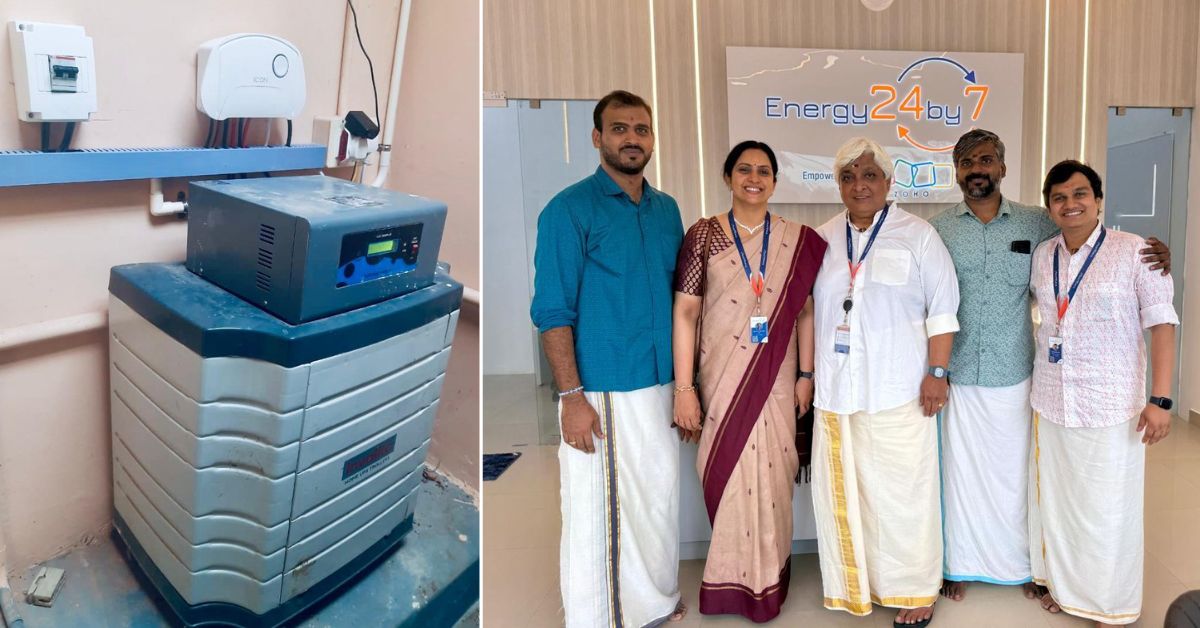When the lights go off in Malappuram, Kerala, most people rush to find candles and torches, or wait anxiously for the power supply to return. But in one corner of town, Suresh Vijayakumar barely notices.
“I can’t even think about a power outage now,” Suresh says with quiet pride.
At his home and office space, almost everything runs on automation. “Apart from lights and fans, I have one water pump, three pressure motors, an automated rolling shutter, a smart lock, two smart switches, two modems, and a Wi-Fi router. My home and office are kind of an IoT-connected place. Managing all this without failures was a real challenge for me,” he explains.
That challenge ended when he discovered the Kerala-based renewable energy startup ‘Energy24by7’.
A home that no longer fears outages
For the past year, Suresh has relied on the company’s iCUBE 2000 inverter, paired with two iSTORE 160Ah batteries and two 545W solar panels on his rooftop. The system takes care of his daily load — lights, fans, pumps, motors, shutters, and routers — while cutting his Kerala State Electricity Board (KSEB) bills by 45 to 65 units a month. It runs mainly on solar during the day, drawing from KSEB only when the battery runs low or sunlight is weak.
“What impressed me most is that the inverter draws daytime electricity directly from solar. Once the battery is charged, iCUBE shuts off the KSEB supply. If the sunlight is good, you can run 600–700 watts straight from solar. If the consumption exceeds that, it switches to KSEB seamlessly. I don’t even notice the transition,” explains Suresh, who lives in the Aliparamba village.
Advertisement
The iCON device enables households to connect their old inverters to solar panels, fostering an affordable transition to solar energy.
Last year’s monsoon put the system to the test. A storm destroyed 25 electricity poles and blacked out his neighbourhood for five days. Yet Suresh’s house and office remained powered. “For that entire week, I was practically off-grid. My work didn’t stop even when the rest of the street was dark.”
The student idea that became a solar revolution
Suresh’s story reflects exactly what Harsh Mohan (34), co-founder of Energy24by7, and his peers dreamt of back in 2011. Then undergraduates at Amrita Vishwa Vidyapeetham, Amritapuri, they were searching for a meaningful project when they stumbled upon something simple but striking: nearly every household in India had an inverter, but these machines consumed power daily just to stay alive, often adding 1.5 to two units to the bill per day.
“At the same time, solar was making headlines, but at a steep cost,” Harsh recalls. “Installing rooftop solar meant discarding your existing inverter and buying a new, solar-compatible one. It was unaffordable for most families and created huge amounts of e-waste.”
That challenge sparked an idea. Guided by his professor Dr Vinod Gopal, Harsh began tinkering with a solution: What if, instead of replacing inverters, they could create a small device that connected any inverter to solar panels?
Reiterating this idea, Nishanth CP, co-founder of Energy24by7, explains, “That way, households could adopt solar without buying a new system, reducing both costs and pollution. Our aim was to make solar accessible to middle-class families, not just the wealthy. Back then, panels were very expensive, and people thought solar was only for the rich. We wanted to change that.”
That device became ‘iCON’ (Intelligent Converter). “Suddenly, families didn’t need to spend lakhs on a new solar system. With a modest investment in iCON and panels, they could turn their old inverters into solar inverters overnight,” Harsh says.
Advertisement
From Left: Harsh Mohan, Dr Vinod Kumar Gopal, Nishanth CP, Lakshmi Nambiar, Kiran S.
In 2017, after nearly five years of product iterations and patent work, Harsh and his colleagues, Dr Vinod Gopal, Lakshmi Nambiar, Nishanth CP, and Kiran S, formally launched ‘NyQuest Innovation Labs Pvt Ltd’. The company was later rebranded as Energy24by7 to make the brand more customer-friendly and mission-driven.
Turning feedback into a smarter inverter
The launch of iCON opened doors, but customer feedback soon pushed the team further. “Many people told us their old inverters were noisy, inefficient, and bulky,” Harsh recalls. “So we decided to build a new solar inverter on our own.”
The result was ‘iCUBE’, a high-efficiency smart solar UPS that brought together the roles of iCON and a regular inverter in one device. “Most inverters in India run at a lower efficiency, but iCUBE tested at an impressive peak efficiency of 97 percent—making it even better than the benchmark five-star standards,” Harsh adds.
Beyond efficiency, iCUBE was designed to adapt to household usage patterns, deciding when to use solar, when to draw from batteries, and when to tap into the grid. Their patented Battery Charging Inhibition (BCI) prevents wasteful charging from the grid, cutting hidden costs that many households never notice.
Harsh says the appeal is immediate for middle-income families. “It lowers bills by around 40–50 percent without massive upfront costs. The setup keeps homes running during outages for days. You can monitor its performance through our mobile app. It is compatible with lithium-ion and even EV batteries.”
Energy24by7 has more than 1,000 customers across Kerala, Tamil Nadu, and Karnataka.
Navigating the challenges of building hardware
However, behind the success lay a long road of challenges.
Advertisement
“The biggest challenge has always been funding,” admits co-founder Nishanth. “In India’s startup ecosystem, hardware rarely gets the same attention as software. Investors like fast-scaling apps with quick returns. But hardware requires long-term investment, multiple prototypes, and a lot of testing.”
Nishanth adds that every time they set up a system in someone’s home, they would discover something new the customer wanted. That meant going back, redesigning, and swapping out parts — a slow, painstaking process that most investors didn’t have the patience for. What kept them going were the central and state government grants and support programmes, especially from the Ministry of Electronics, which gave them the runway they needed.
From Kerala to the world
Today, Energy24by7 has more than 1,000 customers across Kerala, Tamil Nadu, and Karnataka, and is also making inroads into Africa with installations in Kenya and Zambia.
Energy24by7 developed the iCUBE, a more efficient and integrated solar UPS that ensures up to 97% energy efficiency.
Looking ahead 10 years, Nishanth says the ambition is to become one of the leading global players in the energy arbitrage space. “If you look at markets like Australia or Europe, they are five to 10 years ahead of India. In Australia, for instance, half the households already have rooftop solar. Now the government is incentivising battery storage so people can store daytime solar and use it later during peak demand.”
He adds that the team is now working on products designed to store energy when prices are low and supply it when they’re high. Their advanced products, he says, are aimed at developed markets, while the current solutions are better suited for countries like Africa, Central Asia, West Asia, and South East Asia, where affordability and adaptability matter most.
The startup’s innovations have also drawn recognition abroad. They were finalists at the Global Climate Launchpad (2021), winners at Kerala Startup Huddle Global (2022), and featured twice in the SET100 Global List in Germany (2023 and 2025).
Advertisement
But Harsh insists awards are secondary. “The most rewarding moments are when customers call us, not just to thank us, but to explain in detail how our product works for them. When they teach us back our own product, that’s when we know we’ve made an impact.”
Back in Aliparamba, Suresh agrees. “It’s not just about savings,” he says. “It’s about peace of mind. My work, my family, my smart home — they don’t stop because of a power cut. I don’t worry about electricity cuts anymore.”
All images courtesy: Nishanth CP.







